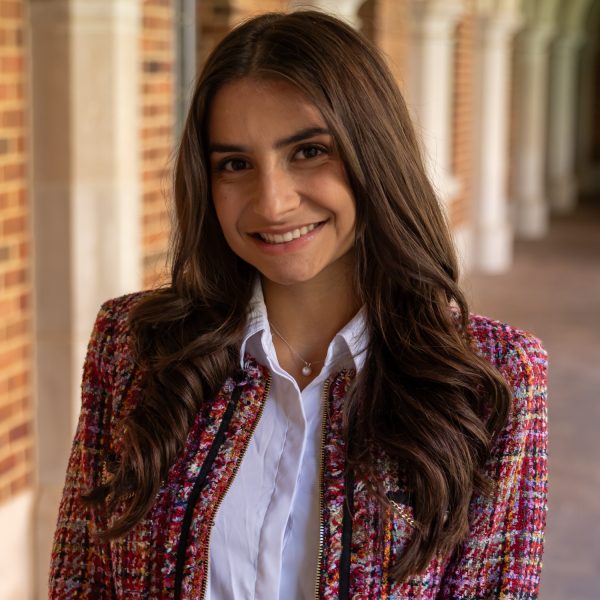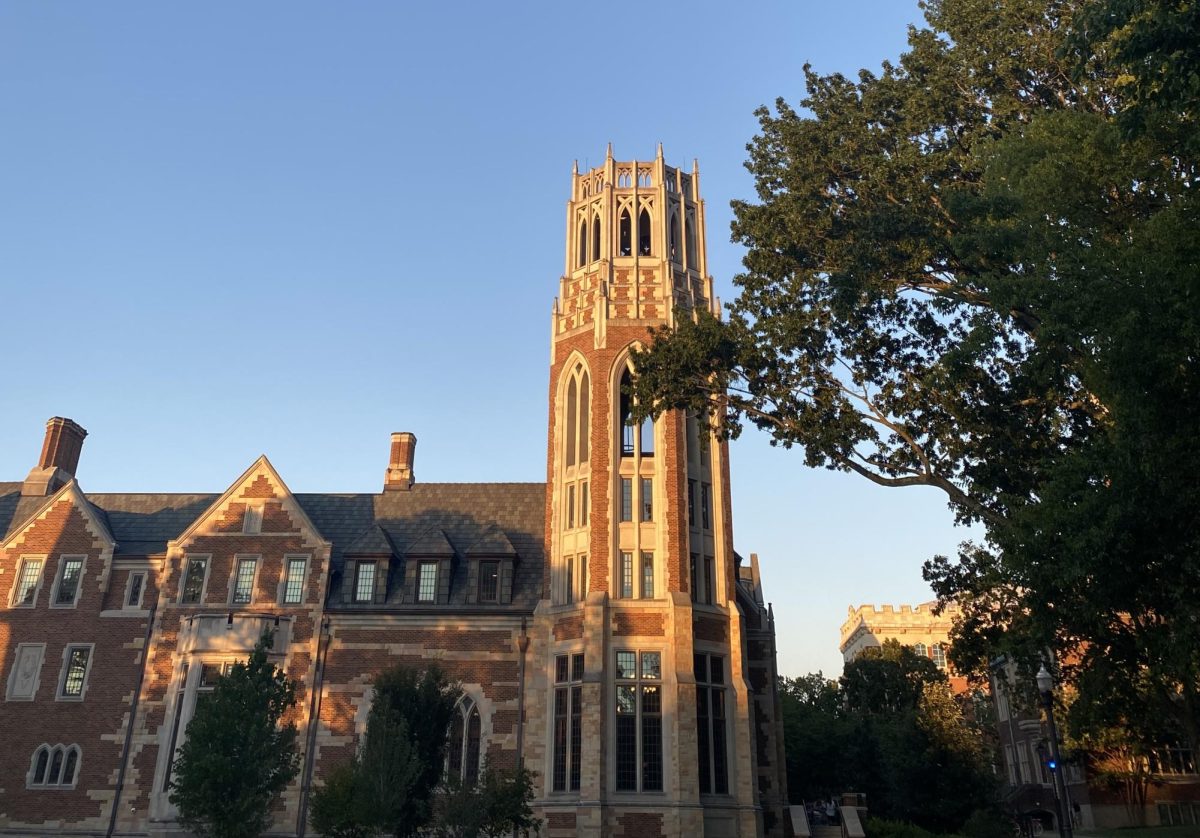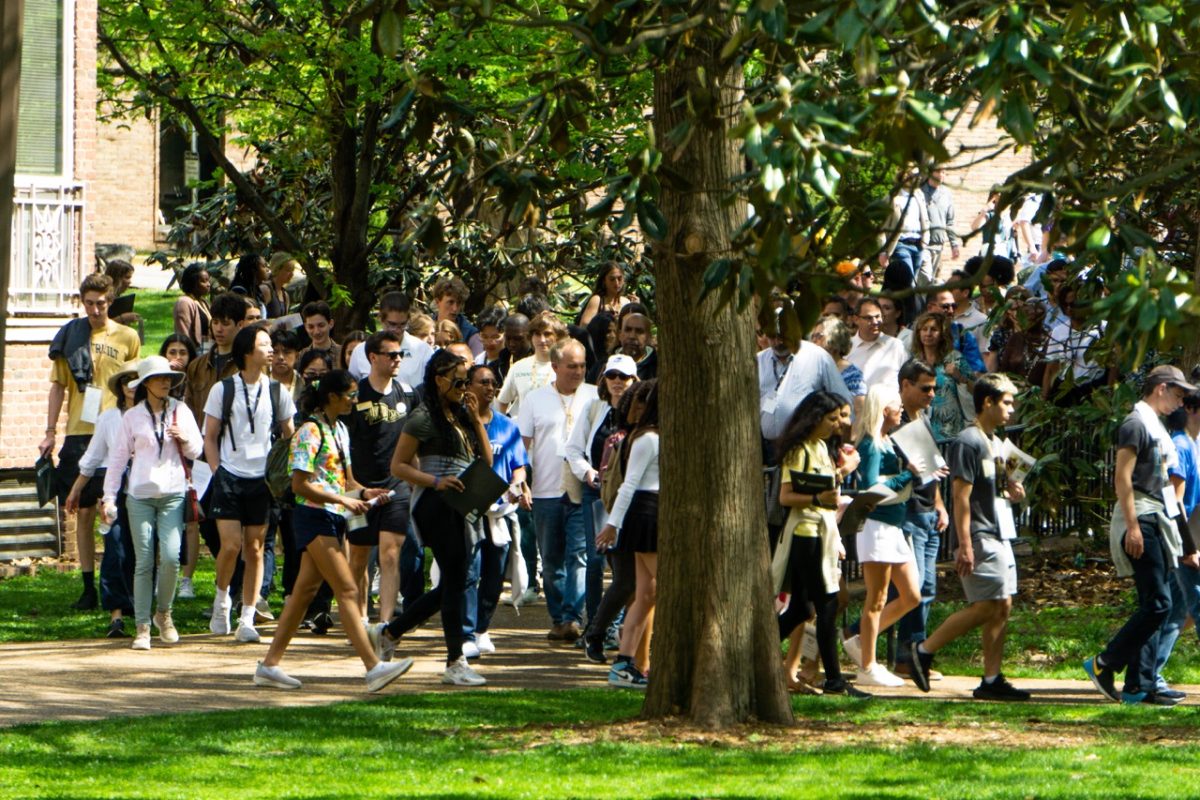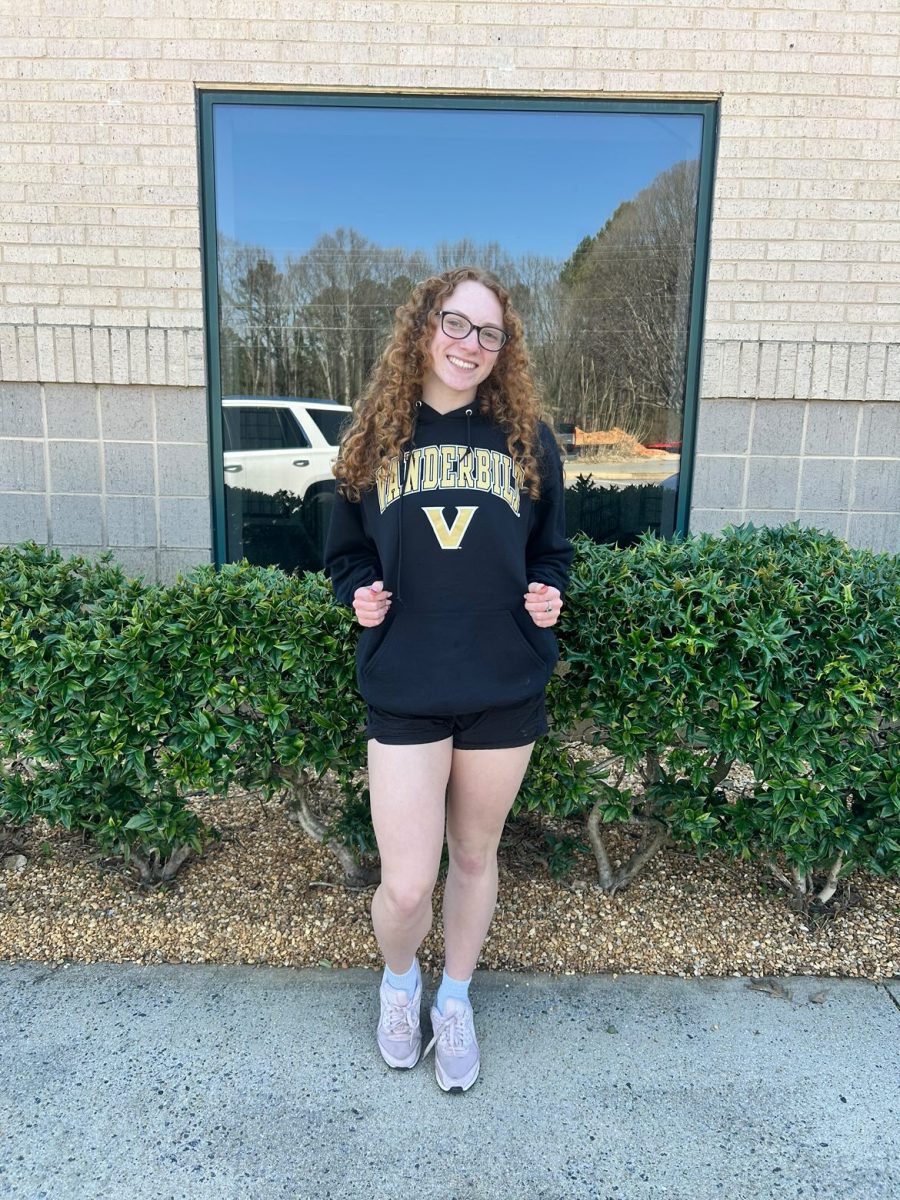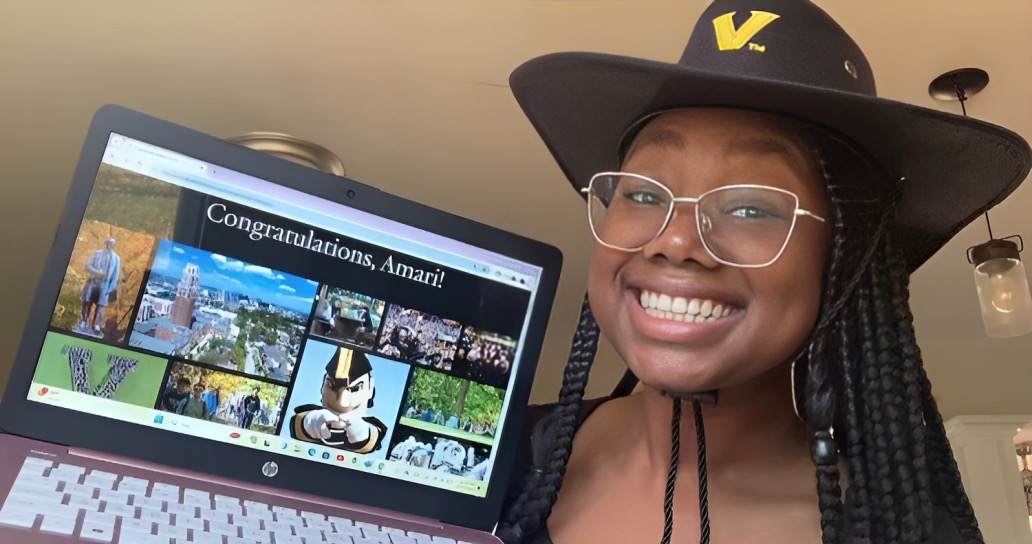A record-low 3.7% — 1,512 — of Vanderbilt regular decision applicants were admitted on March 27, adding to the 889 students admitted via early decision. The university accepted 251 fewer RD applicants than the Class of 2027, 451 fewer than the Class of 2026 and 751 fewer than the Class of 2025 due to its increasing yield rate.
Across all admission cycles, 5.1% of applicants have been admitted so far. Vice Provost for University Enrollment Affairs and Dean of Admissions and Financial Aid Doug Christiansen emphasized that the overall acceptance rate for the Class of 2028 will not be finalized until after the waitlist is closed, around mid-summer.
Admissions trends
Vanderbilt’s RD, ED and overall acceptance rates have steadily declined over the past few years, while its yield rate — the percentage of admitted students who choose to enroll at Vanderbilt — has consistently increased.
Despite Vanderbilt’s increasing yield rate, the number of available spots in the Vanderbilt first-year class has remained constant at around 1,620, leading to fewer and fewer students being admitted each year.
“Every year, as we continue to be a little more selective because of the yield rate,…the Vanderbilt degree continu[es] to become worth more and more in the marketplace. That’s good for people looking for jobs and going to [graduate] school,” Christiansen said. “It’s our current students who…, as they continue to excel and do better and great things, get more students who want to apply here.”
The increasing yield rate also has affected the number of students admitted from the waitlist. While waitlist data will not be available until the fall for the Class of 2028, 81 fewer students were admitted from the waitlist to the Class of 2027 compared to the Class of 2026. Christiansen said approximately 8-10% of the Class of 2028 will come from the waitlist as in previous years. He explained that students are admitted by school off the waitlist and by specific program in the Blair School of Music and Peabody College of Education and Human Development.
“We try to avoid thinking of that number [overall acceptance rate]; it’s broken down,” Christiansen said.
Similarly, Christiansen said 10% of the Class of 2028 will be made up of deferred students. The number of deferred students has increased to 600 since it began with the Class of 2026. He said the university purposely does not waitlist deferred students to keep their hopes high falsely; this year, he said three deferred students were waitlisted for “unique” reasons.
Christiansen declined to disclose the waitlist acceptance rate for the Class of 2027 and the number of students waitlisted for the Class of 2028. He stated he was unsure of the acceptance rate of deferred students for the Class of 2028.
The university received 216 more ED applications and 165 fewer RD applications to the Class of 2028 versus the Class of 2027. Although Vanderbilt received slightly fewer applications this year, Christiansen emphasized that the university’s 30% increase in applications during the COVID-19 pandemic — a trend mirrored across the country — largely has held constant after the pandemic subsided.
RD admitted student profile
Christiansen said around half of the RD pool — and the overall applicant pool — submitted test scores, similar to previous years. This pattern has remained consistent over the past few years. The median ranges of SAT and ACT scores were slightly higher among admitted RD students than admitted ED students. Christiansen emphasized that he believes this difference is negligible.
“It could be one student who flips it [the median range] over,” Christiansen said. “I would argue that the scores from a percentile basis are almost identical.”
Students from 48 states were admitted to Vanderbilt via RD this year, with students from the other two states being admitted via ED.
Christiansen reiterated that racial demographics will not be available until Fall 2024 — after waitlist admissions have ceased — due to the U.S. Supreme Court’s outlawing of race-based affirmative action in college admissions. He stated that this data is not made public to prevent bias in admissions.
“Most of the staff doesn’t know these statistics because we are still actively admitting because of waitlisted students. We don’t want there to be any kind of influence [on admissions from these statistics],” Christiansen said.
Among students admitted through RD, 13.4% live outside the U.S., 18% are first-generation college students — defined by Vanderbilt as the first students in their families to graduate college — and 10.6% are from domestic small towns and rural communities. This data was not released for the ED pool.
As of Fall 2023, 16.6% of undergraduates identified as first-generation college students. Christiansen serves as the co-chair of the national Small Town And Rural Student (STARS) Network, which was established in April 2023 with a $2 million grant aimed at reaching and supporting students from such communities. Vanderbilt also houses a STARS undergraduate student organization to provide community and resources for students from small towns and rural areas. On April 3, this organization won the Vanderbilt Awards for Leadership and Excellence Diversity and Inclusion Award for its outreach efforts to students from small town and rural areas alongside the Office of Undergraduate Admissions.
Next steps for admitted students
Dubbed “Anchor Day,” admitted students day will occur on April 13, overlapping with MOSAIC Weekend. Before race-based affirmative action was outlawed, MOSAIC Weekend was held earlier in the year, typically in mid-March. This year, the fly-in program for diverse admitted students will run from April 12-14 and will continue its goal of introducing students to Vanderbilt’s multicultural student life and support.
Admitted students have until May 1 to officially commit to Vanderbilt. In the wake of recent student protests on campus, Christiansen declined to comment on whether admitted students can expect to feel heard by administrators and have accessible means to discuss ideas with them if they attend Vanderbilt. He emphasized the collaborative and civil nature of Vanderbilt’s campus culture.
“Civil protest and the ability to share ideas is completely appropriate within the confines of when that does not disrupt daily business,” Christiansen said. “When I work with our prospective students and newly admitted students, what we would be talking about is the importance of free expression of ideas — which we would support — and the ability to think and have different viewpoints. We would expect that, though, to be done civilly and carrying with an understanding of different sides of the issue.”
Accepted student reactions from RD pool
Allie Schwartz, a Houston native, recently committed to Vanderbilt after being deferred from the EDI pool. She plans to major in biology on the pre-medical track in the College of Arts and Science. Schwartz explained that she had heard positive anecdotes about Vanderbilt and its pre-medical track, but visiting campus confirmed her desire to be a Commodore.
“I fell in love with the culture, the community, the campus, the values,” Schwartz said.
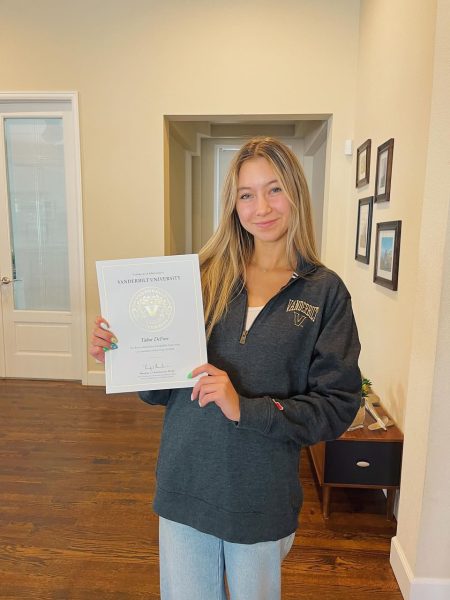
Schwartz explained that being deferred and later accepted to Vanderbilt made being admitted even more exciting and relieving.
“It was an emotional rollercoaster,” Schwartz said.
At Vanderbilt, Schwartz hopes to volunteer at the VUMC Monroe Carell Jr. Children's Hospital after volunteering at the Texas Children’s Hospital during high school.
Grace Trerotola was admitted to the School of Engineering with an undecided major after also being deferred from EDI. Like Schwartz, she said traveling to campus from her hometown of Greenville, Del., cemented her interest in Vanderbilt.
“The Vanderbilt visit was by far my favorite one — from my tour guide being so down to earth and so motivated to being able to see kids have fun but also care about their education,” Trerotola said. “Also, the campus is beautiful and in a great location.”
Trerotola said being deferred was disappointing, but she remained hopeful given Vanderbilt’s low deferral rates compared to peer institutions. On campus, she hopes to join a Panhellenic sorority and mental health and wellness organizations.
“When I got in, I literally cried — I was so excited. It was the most relieving thing ever,” Trerotola said.
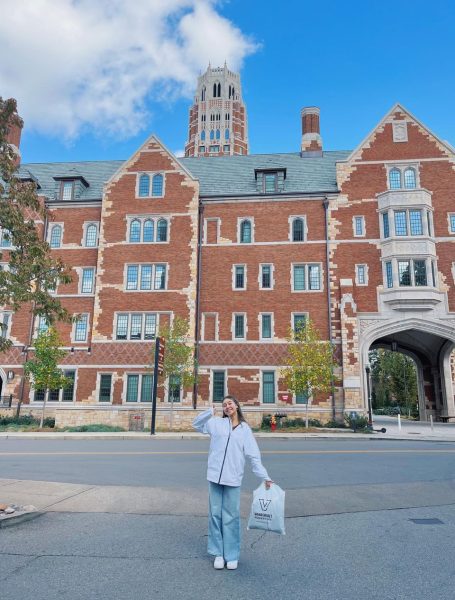
Tabor Defore, an incoming first-year from Castle Rock, Colo., plans to major in cellular and molecular biology on the pre-medical track. She said speaking to current students about their experiences at the university shaped her interest in Vanderbilt.
“During my sophomore year of high school, my English instructor at a community college was a Vanderbilt Ph.D. student, and I truly adored…his outlook on education,” Defore said. “That really drew me toward the school.”
In addition to taking part in the College Scholars Program as a Cornelius Vanderbilt Scholar, Defore hopes to engage in pre-medical student organizations, WilSkills and local community service at Vanderbilt.
“Being from Colorado, it really is such a big change to move somewhere else because it is so outdoorsy focused here,” Defore said. “Volunteer work…is also really important to me.”
Defore and Schwartz both said they are excited to explore Nashville, particularly its live music scene. Defore specifically mentioned wanting to visit the Grand Ole Opry and other historical sites in Nashville.





